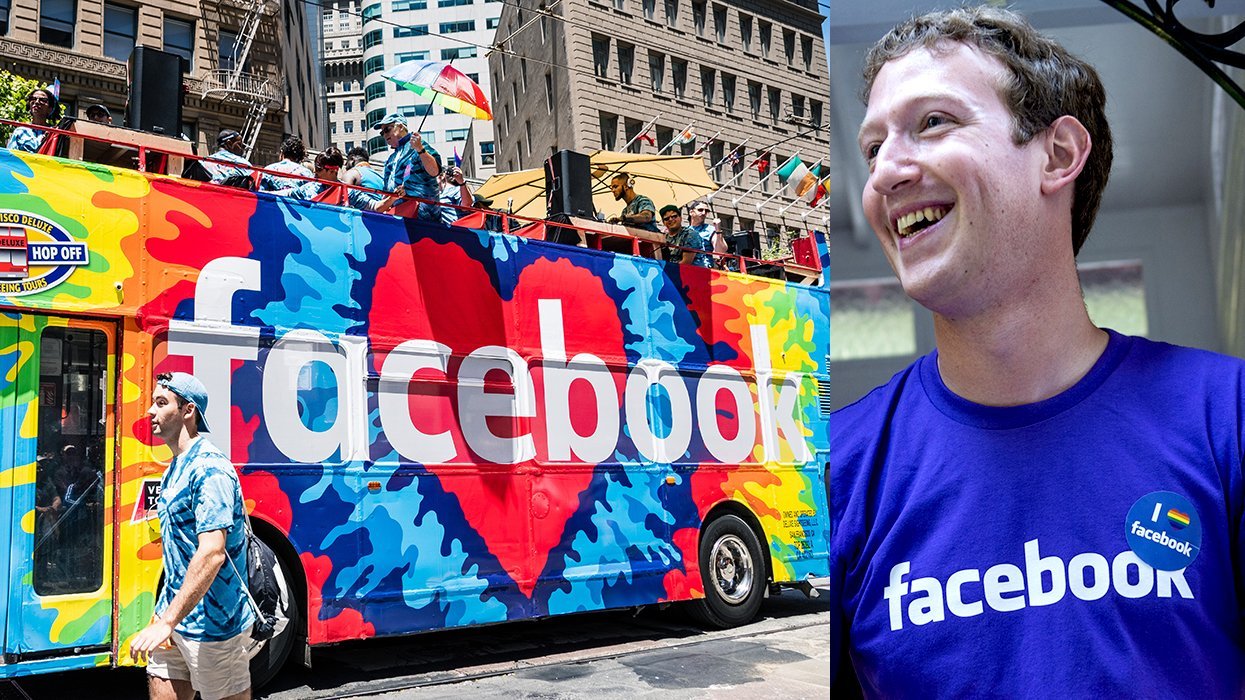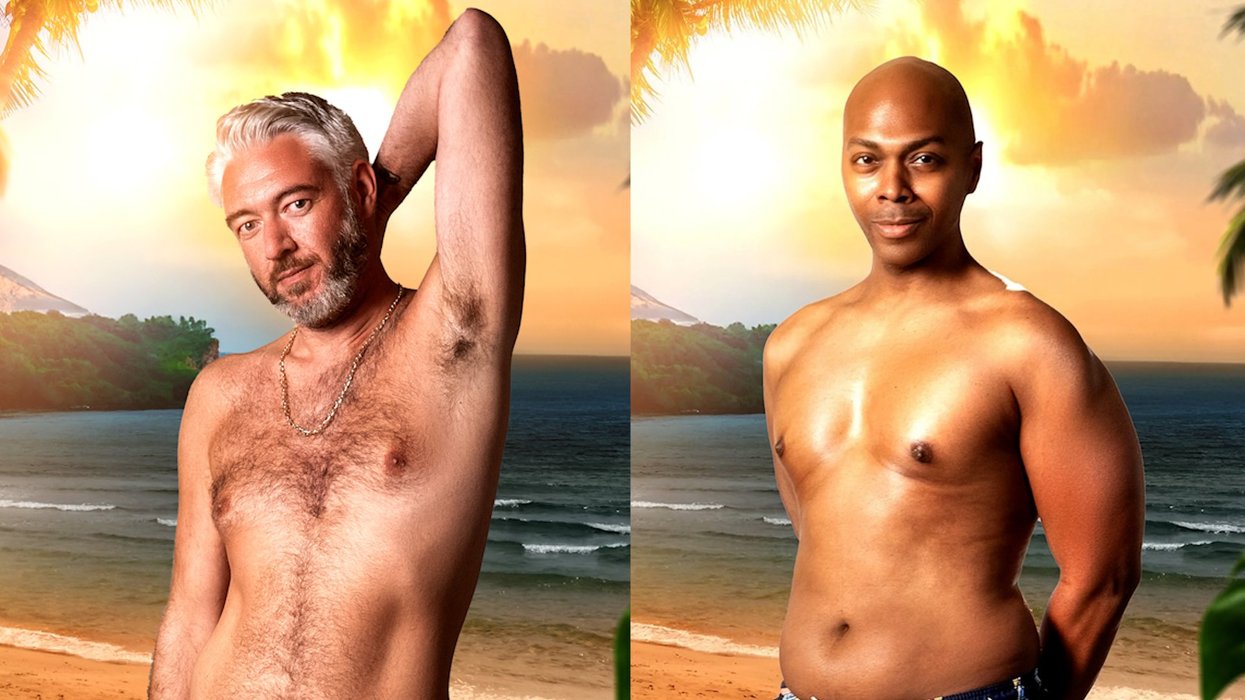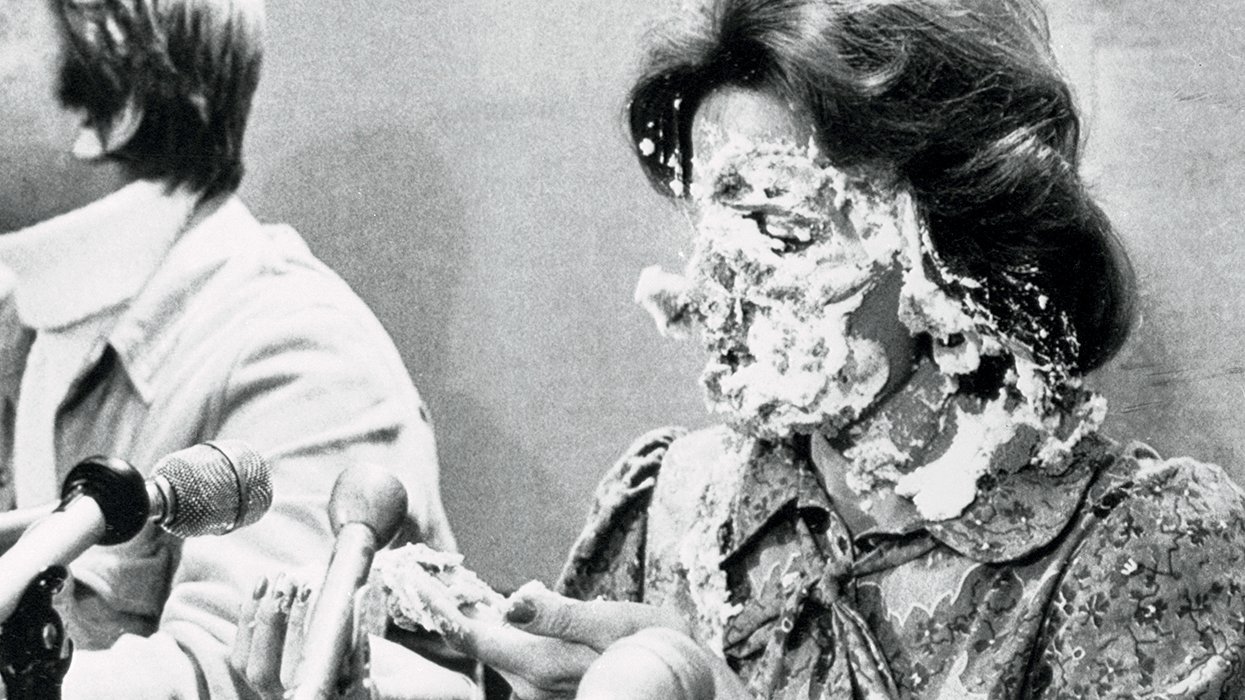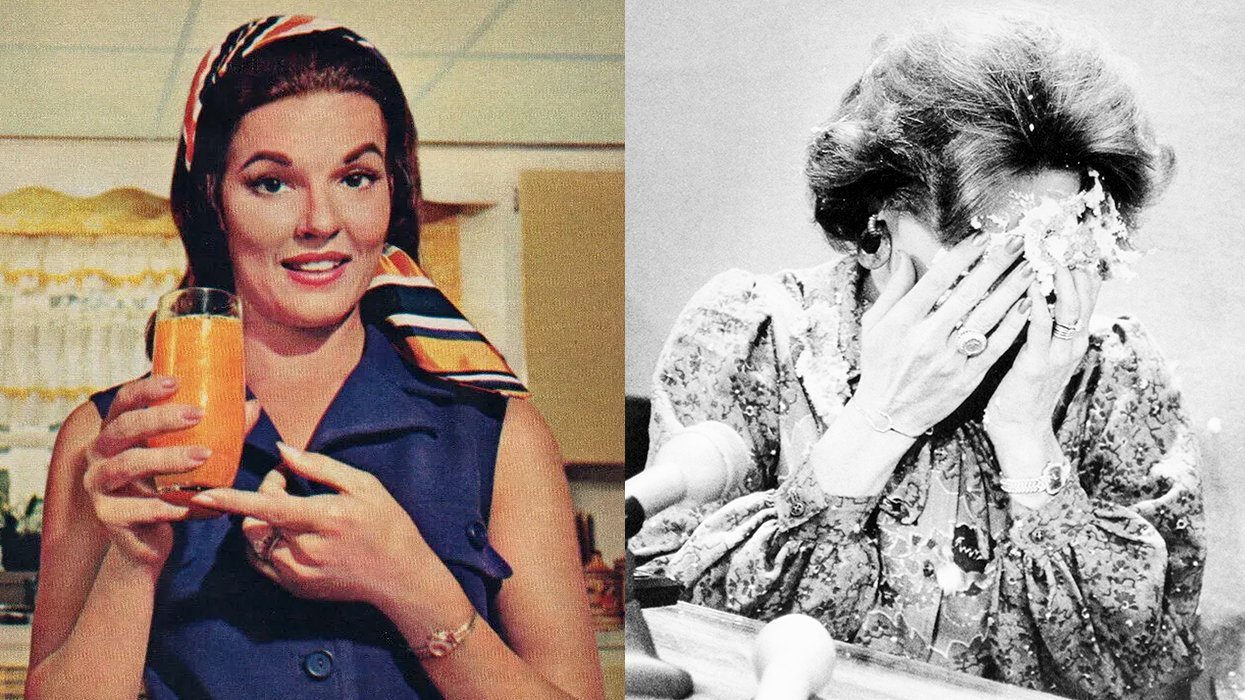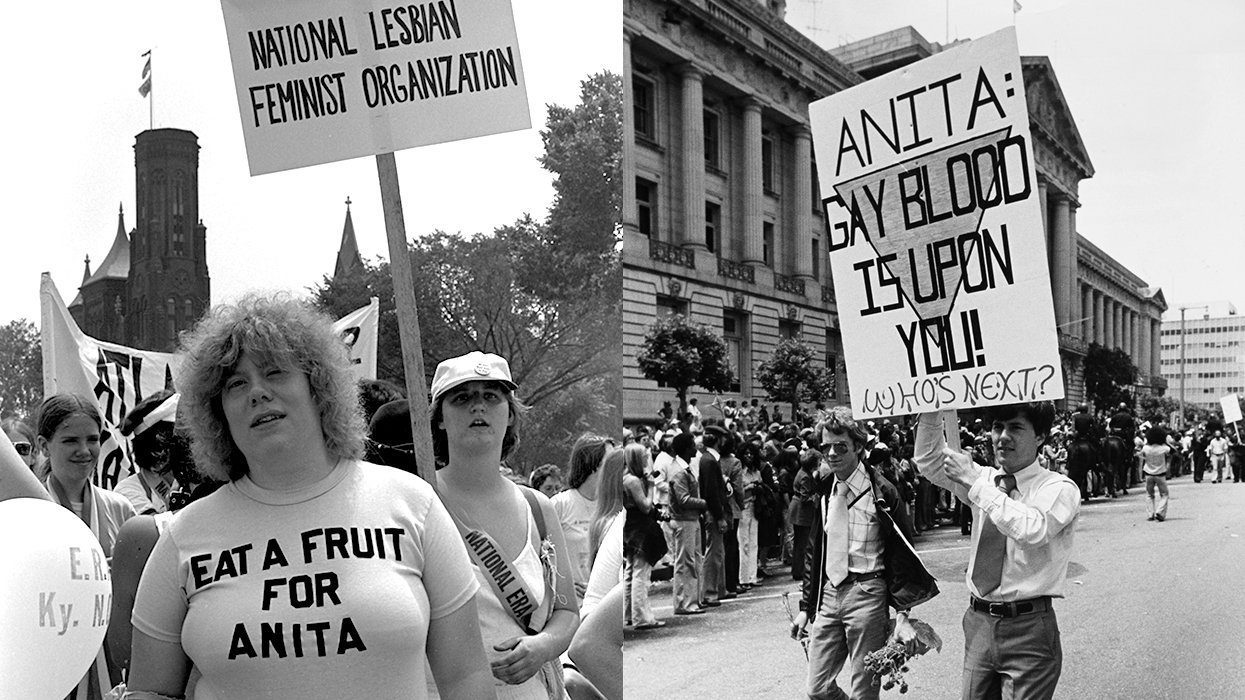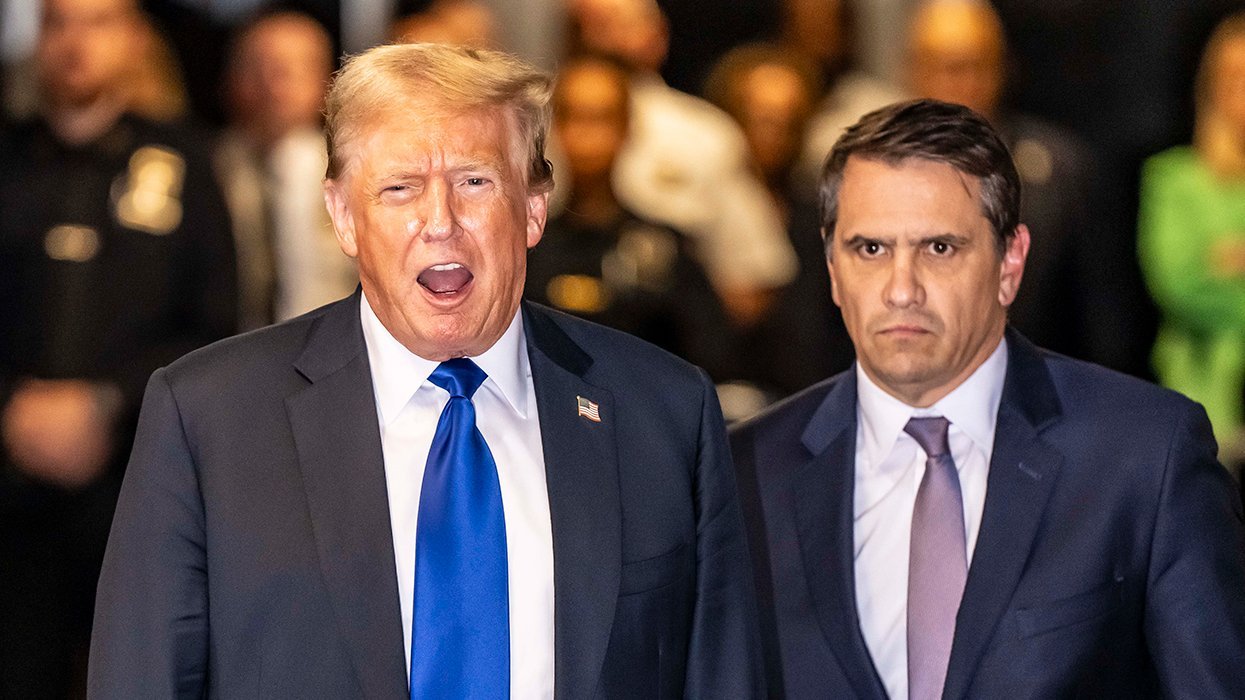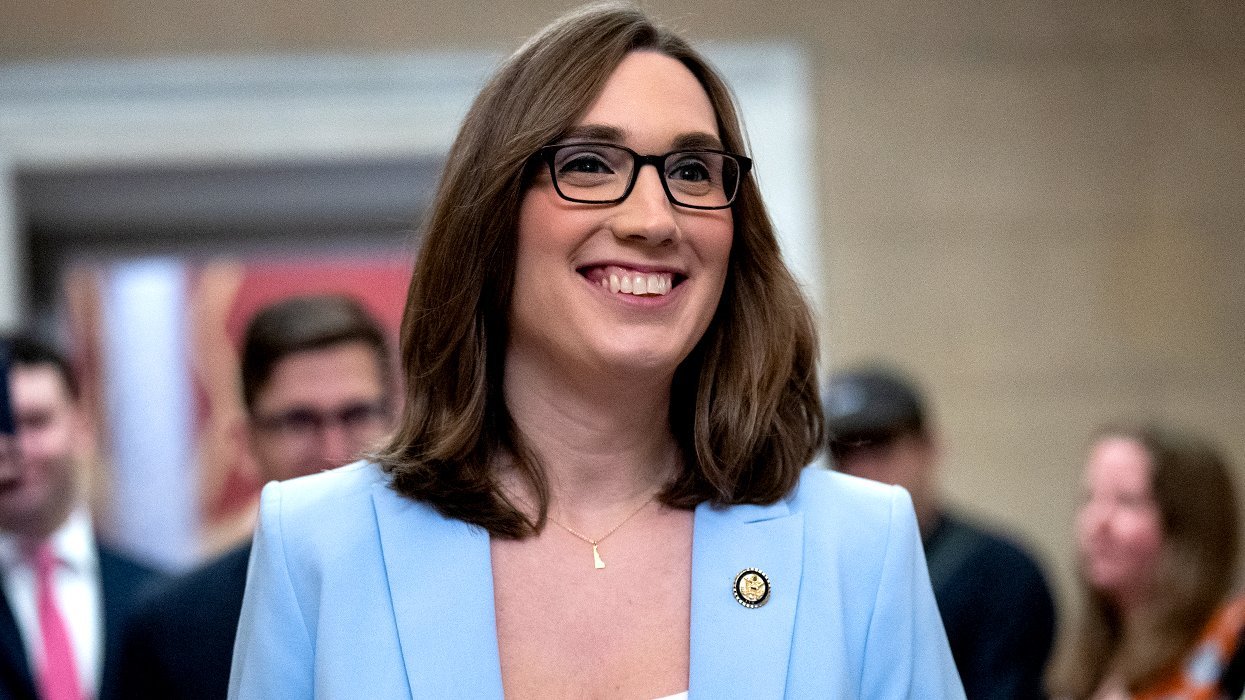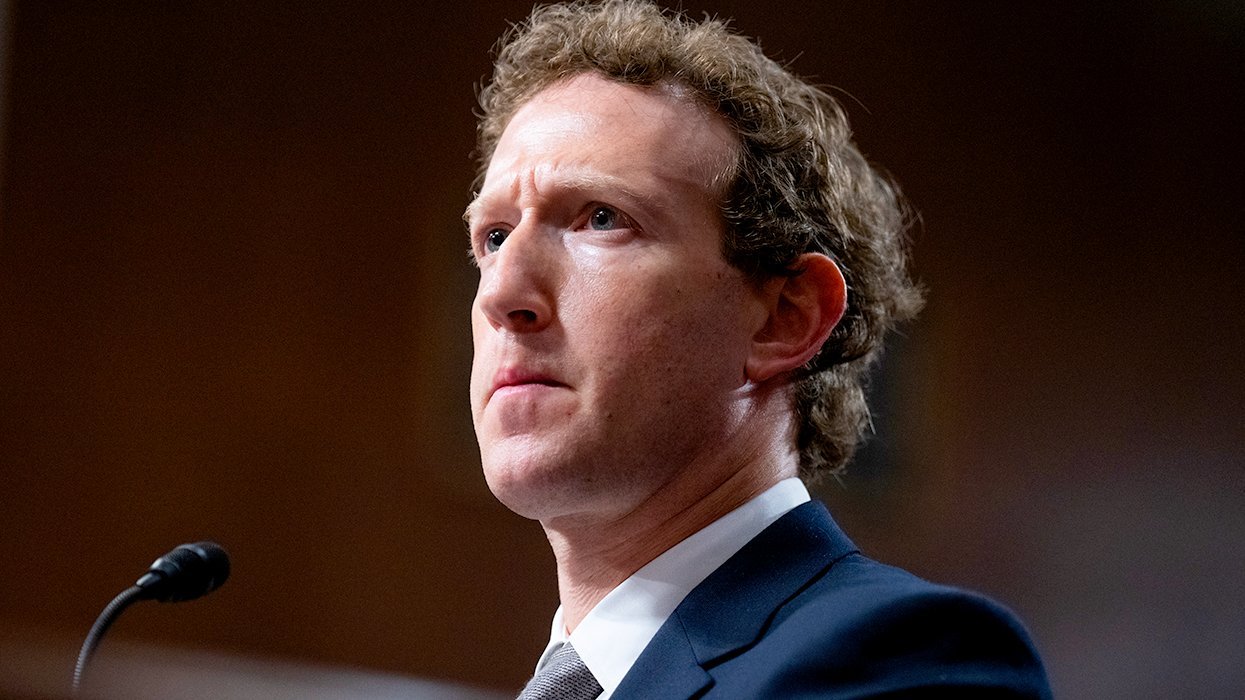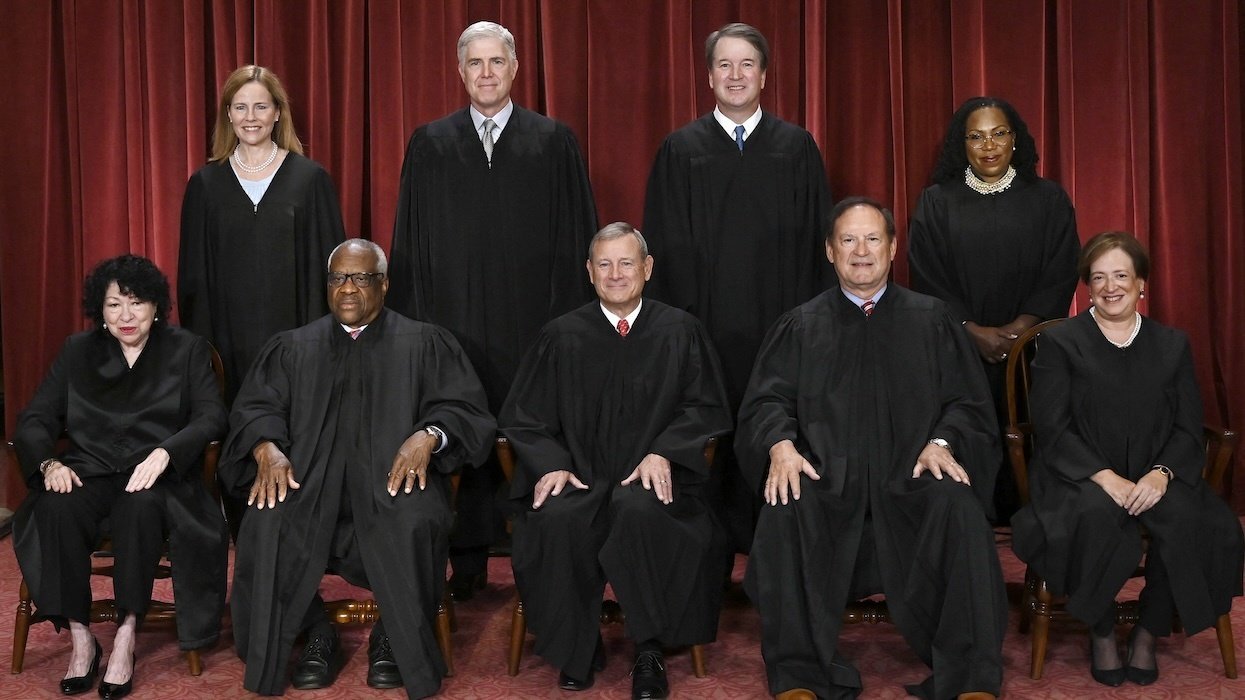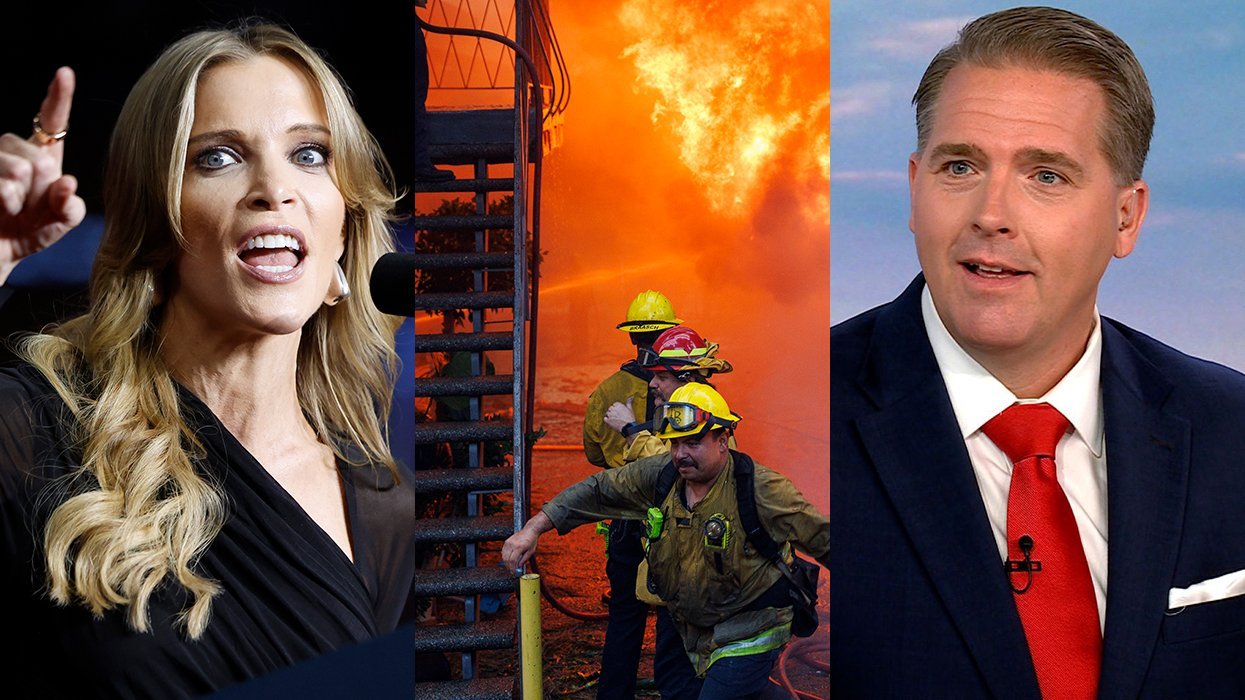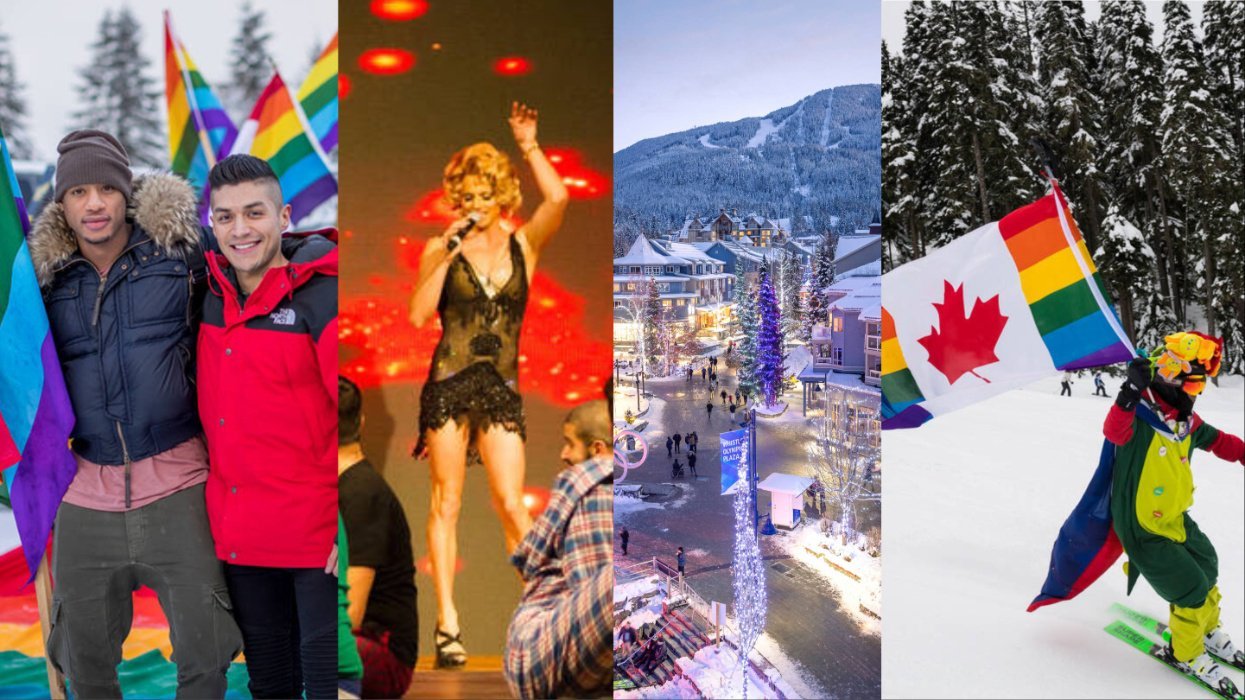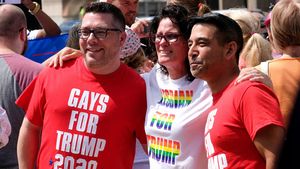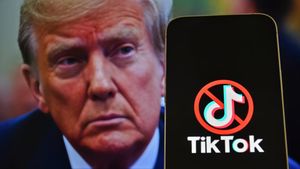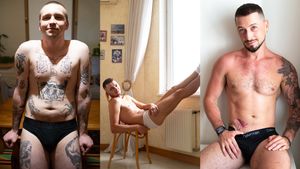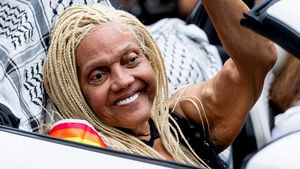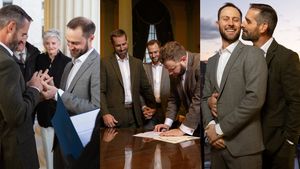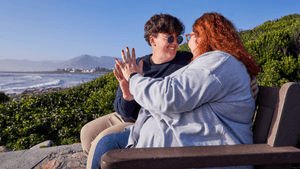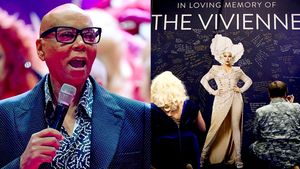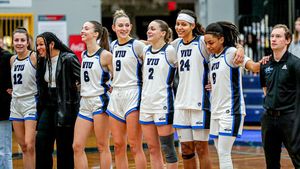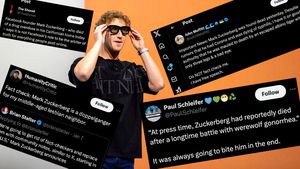World
CONTACTAbout UsCAREER OPPORTUNITIESADVERTISE WITH USPRIVACY POLICYPRIVACY PREFERENCESTERMS OF USELEGAL NOTICE
© 2025 Pride Publishing Inc.
All Rights reserved
All Rights reserved
By continuing to use our site, you agree to our Private Policy and Terms of Use.
Casablanca on the Caribbean
Flags placed at Revolution
Plaza after a holiday. Che Guevara's face adorns a building in the background.
Cuba's many cultural contradictions, curious isolation, and welcoming citizens make it a gay destination worth the effort of getting there.
No place I've visited stirred up such strong reactions from people as Cuba. When I told my 70-year-old neighbor I'd be in his homeland, he stared at me silently, looking as if he were about to cry. Later, his sister told me that their other brother, unable to flee with the family, committed suicide rather than live under Castro. This made me equally afraid to tell an old college friend who left as a baby. He used to spit ferociously, "I hate Castro," every time another student walked by with a communist-themed shirt, as was the fashion then. Still another friend who'd been to the island exclaimed, "Oh, hot! You're going to have so much sex."
With an embargo in place, getting to Cuba is tough for most Americans. Journalists, however, are allowed to make research visits, and I used Miami as a gateway. The flight was uncrowded, but the journey was weighed down with the gravity of the various reasons people were heading to Cuba. After 40 minutes, we approached the edge of the island, and dozens of video cameras were tilted to the windows. Spanish voices murmured throughout the plane, narrating what was being recorded. An old man behind me began singing and weeping as the plane glided lower and lower over the fields outside of Havana. I could only hear certain words of the song, but among them was "Ese es mi vida"--That is my life. I almost wanted to cry as I listened, imagining his sad history. Only the cheering roar on touchdown broke the plane's emotional tension. I was finally in Cuba, a country I'd been told my whole life was an enemy nation.
After a long questioning at passport control, I picked up my luggage and headed to customs. A woman there insisted I had gifts for people and demanded to know their value. I pulled a number out of my head, $100, and she said I must pay a tax of $50. I was shocked, and then even more so when I had to pay a tax on the tax, for a total of $53.00. The answer I got was that someone has to get paid for taking my money. Welcome to Cuba!
The Cuban government once required foreigners to stay in hotels, but no more. I grabbed a cab to head to the gay-friendly private apartment of a friend of a friend, a professor at the University of Havana. If you plan to have anyone visit you, this is a better option as hotels never allow visitors in rooms.
Hanging out on the Malecon, Havana's faded seaside promenade.
The Vedado address I gave confused the driver, but we figured it out. Looking at the sad shape of the building's exterior I was a little apprehensive, but the apartment was as warm and inviting as my hostess Laubel's personality. The first thing she did was to pull me to the huge windows overlooking the Malecon, the seaside promenade. The view was stunning, and the winter waves of the Caribbean were breaking over the seawalls. She pointed out things like the monument to the Battleship Maine and the former U.S. embassy. Finally, she sighed and said, "On a clear night, my neighbors say you can see the lights of Miami in the distance. I look, but I never see them." She then stared out in silence through the glass at the dark, empty ocean. It was amazing to me how Miami and Havana longed for each other, like two lost sisters, each one reaching out, thinking it might save the other from itself.
After explaining about keys, breakfast, maps, and the idiosyncrasies of Russian appliances, Laubel finally left, leaving me to my own devices on my first Havana night. I'd read all I could on gay Havana, and the first place I headed was "the Corner"--the intersection of Calle 23, also known as La Rampa, and Calle L. Here was the ice-cream palace called Coppelia, made famous by the movie Strawberry and Chocolate, where the gay man picks up a straight man. It was only a 10-minute walk from the apartment. Laubel, with motherly caution, had said to "use discretion" if I met someone along the way.
Coppelia is the ice cream palace in the gay Cuban movie Strawberry and Chocolate. At night, this fence is sometimes lined with men waiting to meet gay tourists.
I'd already seen the Corner in the daytime, having passed it in the cab coming in. In the bright sunshine, the area seemed so full of life, with people running back and forth across the street and in and out of shops. The Yara Cinema was on one side blaring the words Tom Cruise and Minority Report, which so shocked me on the way in. Up on the next corner was the ritzy Habana Libre, the city's largest hotel, opened as a Hilton only months before Castro took power. He proudly seized it and made it a temporary headquarters. The area was a part of the city's rich revolutionary history, and at night it seemed all ours.
But looks are deceiving. Yes, young gay men and a few women crowded here. Some flirted with their friends, showed off new club clothes. A few even dared to be in drag, hair sexily coiffed, slicked curls edging down long slender necklines. Others eyed the tourists who came by to pick them up, to find out more about gay life, to figure out how to get to the parties. As conspicuous as we gays were, though, so were the police. Over the several days I was in Havana, they would frequently whip through the area, whistling gay people away, hauling some off for questioning.
The young men who preyed on tourists are known by two different names. One is a jinetero. His job is providing you whatever you want--a restaurant, cheap cigars, or a casa particular, the type of private apartment in which I was staying. He might also try to find men to make your night less lonely, or offer himself to do the same. Some of these men go by the more direct name of pinguero, which comes from the Spanish word pinga, or penis. Most were macho, handsome, a little on the rough side. All claimed to be students at the university a few blocks away, but demurred when I mentioned my hostess was a professor.
My first night I ignored these men. Instead, I looked at the decayed remnants of the neighborhood's turn-of-the-century buildings paid for with sugar money in the city's economic heyday. I also passed into Coppelia, and the guard stopped me, telling me I had jumped the line. Cubans waited on long lines to pay with pesos in this funky space-ship-shaped building. I gently argued with the guard, a flirtatious young woman, that all I wanted was to see the place made so famous by the movie. She tried to direct me to the dull side tables for dollar-paying foreigners, away from the exciting local crowds at the heart of the building. After a moment, though, she explained that if I bought her an ice-cream cone, I could go wherever I wanted. I never found a straight man to try to recruit while I was there, but it was fun seeing the place.
Old cars near the Capitolio in downtown Havana.
My next night, I decided to learn about gay nightlife. I hit the Corner and scanned the crowd. My eyes fell upon a man who was already noticing me. Tall and thin and only 24 (I learned later), his name was Luis, and he had two friends with him. One was his extremely handsome uncle Federico, who was just a few years older, and someone who went by the name Marilyn. I asked if they were going to the party, referring to the roving gay soirees held on the outskirts of the city almost every night. We became fast friends, and they were excited to learn I was a journalist looking at gay life in Cuba. After the night before, watching the police harass the crowd, I was surprised how open and daring Marilyn was in a slinky halter, tight skirt, and thick makeup. She described herself best by saying, "I look like a woman but I think like a man." As they introduced me to their friends, some of them jineteros who had tried to chat me up the night before, we played a game, dashing quickly away whenever the police passed.
Finally, when it was time to head to the party, Marilyn said, "Run, run, quickly, don't let the police see," and the cab she'd made a deal with pulled to a dark side of the street and we hopped in. "Is it like this every night?" I asked Marilyn, even though she said life improved after Strawberry and Chocolate.
"Yes, but it's only a game," and then she pursed her lips, held her hand to her neck and insisted, "Honey, we have the real power."
I loved her defiant ways, and we continued chatting, but my hands edged closer and closer to Federico's knees as the taxi jostled us around. I couldn't help myself, and while we continued out of the city into the middle of nowhere, I became too busy kissing Federico to talk to Marilyn.
We passed into an industrial zone and Marilyn said we would soon be there. Suddenly, though, we came to an abrupt stop. The cops had set up a roadblock and were interrogating cab drivers. "Be quiet, everybody," Marilyn said. I was nervous, thinking I couldn't live like this every night just to go to a party, but Federico kept his arm over my shoulder. Even if this were routine for him, I cut the affection. A breathless five minutes later, we were on our way.
Soldiers at the Marcha de las Torchas in Havana, celebrating the birthday of Cuban national hero Jose Marti.
They paid for the taxi, and I paid for our admission, $5 either way. Then we entered into the open courtyard of a cluster of small houses, lights strung among them. This was the party. I offered to pay for the first round (not realizing this would become every round) but for 10 bucks, we had a bottle of rum and some sodas. The music was a mix of U.S. rap and disco and Latin-American pop. Eventually, nearly 400 people would crowd the courtyard: Havana boys and girls and very happy foreigners. Federico introduced me to some Italian and Spanish tourists who came every year.
By 4 in the morning, we returned to Havana. It was obvious Federico was mine for the night, but the group wanted to hit a bar. We wound up on the corner and headed to La Arcada on M Street and 23rd. A government-owned 24-hour establishment, this was effectively the only gay bar in town. It was crowded with dozens of young men and their foreign suitors, and just as many waiting to get in.
We found a table and I paid for another round, wondering how long my budget would hold out playing sugar daddy. For such a cheap country, a night out had grown to be quite expensive. Marilyn still entertained us with her outspoken antics, and I closed in on Federico as much as public decorum would allow.
He had looked polished on the Corner, dressed in his nightclub best, but hands, as Rhett said to Scarlett, are the giveaway. They were scarred and work-worn. I also noticed a tattoo hidden on the inside folds of his fingers. I thought it was an odd place for one, and for some reason, I assumed it was from a penitentiary. Knowing people could go to jail for the silliest things in Cuba, I asked him what he was in for. "Accidental murder." He'd hit a friend over the head in a bad fight. "Oh," I said, as my fingers traced the faded tattoo. Well, as far as I knew I'd never been to bed with a murderer before, and for some reason I didn't think it was an issue. I was even oddly happy at his honest answer. You wind up in strange places, find a companion, and stop asking questions. In fact, it felt like maybe this is how things worked out in movies like Casablanca.
The next several days I spent exploring what Havana was famous for--its architecture. While the neighborhood of Vedado dated back only 100 years to the American conquest of the island, Old Havana still retains much of what the Spanish built centuries before. The place is surprisingly touristy, far from the untouched paradise we assume it is. Tour guides hold up umbrellas, leading literally hundreds of people through the twisted streets. Mojitos, the drink every tourist wants, can be more expensive here than in Manhattan. There's even a Benetton on one of the old church plazas. Just wait until the Gap and Starbucks are allowed; you won't know it from Boca.
Still, the area retains many historical charms, and the best place to begin is where Havana got its start, the Plaza Mayor. On one side is El Templete, a small chapel over the site of the city's founding mass. Around the corner is the Castillo de la Real Fuerza which once housed all the gold that passed into the colony. Today, it's a ceramic museum, worthwhile mostly for its commanding rooftop view. Another imposing building is the Palacio de los Capitanes Generales, which now houses the Museo de la Ciudad. Try to devote a few hours to it, and while they let you visit without a guide, pay the extra dollar for one. Most of the museum is closed to people who don't hire one.
Old Havana is full of many other museums, some worthwhile, others silly tourist traps, but visit every one you see. None will set you back much in money or in time, unless you choose to linger. The area is itself a living museum and a construction work in progress. Many buildings remain crumbling ruins, others are in the process of restoration, and some, fully refurbished, gleam like new, especially along Obispo Street, the main tourist thoroughfare. At night, this area is hopping with crowded little music bars and locals asking you along the way if you want cigars at special prices.
Obispo empties at Parque Central, dominated by a statue of Jose Marti, a Cuban poet who spurred the revolt against Spain. Some of the city's finest hotels are here, from the ancient Inglaterra to the brand-new Spanish run NH. Around the corner is perhaps the city's most beautiful building, the Capitolio, a hybrid of the U.S. Capitol, Versailles, and St. Peter's. The Cuban President told his architects to build something to make Washington, D.C., jealous, and he succeeded. The guides are also amazingly open about the political issues and problems Cuba faces--something I did not expect.
Across the harbor are a series of forts and monuments. One contains a faro, or lighthouse, with a beautiful view of Havana, especially at sunset. Down the road is the Fortaleza de San Carlos de la Cabana, one of the Spanish Empire's most expensive fortifications. It's a huge and interesting complex now, full of restaurants and shops, and the site of concerts and dance events, all of which seem to be frequented as much by locals as tourists. At 9 p.m., the area hosts a "cannon ceremony" with soldiers in 18th-century costume reenacting the official closing of the port. Che Guevara's headquarters are also here and have been converted into a museum. There are loads of interesting paraphernalia related to this handsome star of the revolution, like a picture of him half-naked in a jail cell undressing in front of Fidel.
On one of my last nights, I met Federico's family. I wanted to see how ordinary Cubans live at home, and, well, did I ever. His house was a two-story cinder-block shack, a replacement for the neglected original which had collapsed. We tried talking about Cuban politics, but every so often he and his sisters would grow quiet. They were making sure the neighbors, members of the Committee for the Defense of the Revolution--essentially spies for the Communist Party--weren't listening. I stayed for dinner, and we watched TV, all three channels showing the same anti-American rally.
My trip to Cuba was not without my own brushes with Cuban authority. As part of my work here, I scheduled an interview with a government official involved in the Havana restorations. He explained I needed to register as a member of the foreign press and that I'd been violating Cuban law by not having done so. Still, as I was leaving in just a few days, we skipped the process. As I was packing on my last day, however, the immigration police came by. I feared being detained as they took notes on me. Ultimately, they decided nothing was worth pursuing since I departed that day. They left amiably, almost happy to have met me. Still, in the back of my head, thinking of the gay men I'd seen hauled off the street, I feared the worst. As soon as they were gone, I looked out the window, straining to see the lights of Miami across the water, swearing I'd kiss the ground on touchdown.
A waiter smokes during his break, leaning on an old car.
So what did I learn? That while some Cubans talk freely in government buildings, others don't have the right to free speech in their homes. That gays and lesbians have to worry that they'll be hauled off and spend a night in jail, while others wear dresses without fear. That the country professes to be socialist, but the U.S. dollar drives its economy. Cuba didn't seem to make sense, but then, what country does? Still, as a journalist, I was privileged to see the contradictions, to experience this difference. A visit to Cuba is something I think every American should have the right to enjoy. But then it wouldn't be the same, now, would it?
Getting There:
Many Americans who can go to Cuba legally may not know it. I have many Cuban friends who had no idea that since the Carter years, they've been allowed to visit family. Doctors, writers, artists, and various other professionals may also obtain licenses to go to Cuba under certain circumstances. The U.S. Treasury's Office of Foreign Assets Control explains this in greater detail. I used the Miami-based C.T. Charters, (305) 445-3543, to book my flights and arrange my visa.
If you're not among the special Americans entitled to travel legally to Cuba, it is possible to do so with educational groups. The Center for Cuban Studies, (212) 242-0559, is one such group and arranges trips with various themes throughout the year. If you and several friends plan to go, they can also arrange individualized trips.
For specialized gay tours of Cuba, I recommend Coda Tours, (888) 677-2632 or (212) 741-5040. They run several every year, staying at top hotels and allowing you to meet interesting people along the way. The staff at Coda was particularly helpful in giving me useful contacts and advice for my trip.
Ultimately, I highly recommend going to Cuba soon, before it becomes like any tourist destination. It is not a gay paradise, but certainly the contrasts will make you happy for what we have and willing to fight any attempt by our own government to limit freedoms here.
All photos by Michael Luongo
From our Sponsors
Most Popular
31 Period Films of Lesbians and Bi Women in Love That Will Take You Back
December 09 2024 1:00 PM
18 of the most batsh*t things N.C. Republican governor candidate Mark Robinson has said
October 30 2024 11:06 AM
True
After 20 years, and after tonight, Obama will no longer be the Democrats' top star
August 20 2024 12:28 PM
Trump ally Laura Loomer goes after Lindsey Graham: ‘We all know you’re gay’
September 13 2024 2:28 PM
Melania Trump cashed six-figure check to speak to gay Republicans at Mar-a-Lago
August 16 2024 5:57 PM
Latest Stories
Adult trans bathroom ban heard in Montana — first anti-trans hearing of 2025
January 11 2025 8:41 AM
These 11 major companies caved to the far right and stopped DEI programs
January 11 2025 8:27 AM
True
Why some lesbians and bisexual women experience poverty
January 11 2025 6:00 AM
Mark Zuckerberg continues MAGA metamorphosis on Joe Rogan’s podcast
January 10 2025 6:17 PM
Meta is ending its DEI programs as it eases protections against anti-LGBTQ+ hate speech
January 10 2025 4:45 PM
‘For the Love of DILFs’ David says Victor was 'sleeping' with another daddy
January 10 2025 4:30 PM
All about Anita Bryant's pie-in-the-face moment — and the gay man who threw it
January 10 2025 3:40 PM
For Anita Bryant, there will be no orange juice in hell
January 10 2025 2:23 PM
'Eat a fruit for Anita:' 10 historic Anita Bryant protest photos
January 10 2025 11:58 AM
Convicted felon Donald Trump sentenced on 34 felony charges
January 10 2025 11:43 AM
Here are the LGBTQ+ celebs impacted by the LA wildfires
January 10 2025 9:38 AM
Mark Zuckerberg’s new Meta policies okay using dehumanizing slurs toward LGBTQ+ people
January 10 2025 9:16 AM
True
What the Great Fire of London can teach us about the Los Angeles fires
January 10 2025 6:00 AM
Supreme Court denies Trump's delayed sentencing — he'll be a convicted felon taking office
January 09 2025 7:54 PM
Anita Bryant, the antigay crusader, is dead
January 09 2025 6:54 PM
Humble ‘first millennial’ Jimmy Carter honored with glorious, funny state funeral
January 09 2025 6:20 PM
Conservatives bizarrely blame DEI for Los Angeles wildfires
January 09 2025 4:10 PM
LA's lesbian fire chief battles blazes and bigots
January 09 2025 4:00 PM
Join the fun at Whistler Pride 2025
January 09 2025 3:00 PM
Trending stories
Recommended Stories for You


















